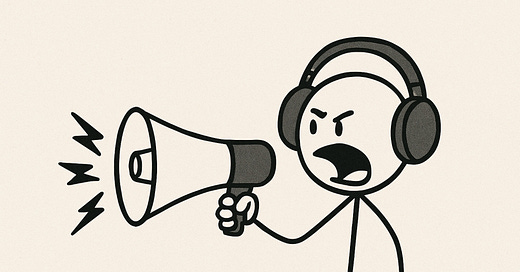Friday Forward - Post & Ghost (#483)
We expect to be heard, but we often aren't willing to listen
Recently, I received two emails from readers who were frustrated about the process of unsubscribing from the premium tier of Friday Forward. The messages had a similar tone: disappointed, and not so subtly implying that I had stuck readers with an unexpected autorenewal and an intentionally difficult unsubscribing process.
I recognize few things are more annoying than subscription headaches, but these narratives did not reflect reality. Friday Forward is hosted through Substack, a widely known publishing platform that handles all billing. Substack also has an extremely straightforward unsubscribe process and renewal notifications sent automatically a week before renewal.
I responded to each of these two emails within a few hours. I apologized for the frustration, offered to cancel their subscriptions personally, and in one instance, comped the subscriber an additional three months as a good faith gesture.
But neither person responded to me. Not even a short note of acknowledgment.
In fact, in one case, the individual then unsubscribed themselves within minutes of my reply. While I don’t know what exactly happened, my assumption is they hadn’t really tried to unsubscribe before sending their agitated email to me.
That got me thinking about a broader trend that’s crept into our communication. Increasingly, we expect to be heard, but we don’t reciprocate by listening to others. We’re all too ready to assume bad intent, fire off a sharp message or social post, and then disappear without any interest in engaging with the other person.
While I send articles to over 100,000 people each week, I am always open to dialogue. Every time someone emails me about a Friday Forward, I do my best to respond personally, even with just a short note of acknowledgement. If someone sends a thoughtful note or detailed feedback, I’ll often reply in kind. Some of the most critical replies I’ve ever received have led to thoughtful exchanges and greater mutual understanding.
But in the past few years, I’ve seen a rise in cases where someone takes the time to fire off a very long email to me that feels more like a soapbox rant, with a low probability of them responding to my reply. These people aren’t looking for a dialogue, they are executing a drive-by critique.
I don’t expect to win over everyone who disagrees with something I write. But I do try to offer basic human courtesy and hope to receive the same in return. And I can’t help but wonder why behaviors we’d never accept face-to-face have become so common online.
Imagine confronting someone directly, airing a grievance, and then walking away as they begin to respond. That would be considered rude or antisocial. And yet, this is normal when screens separate us. No one likes being on the receiving end of a post-and-ghost interaction, but if we’re being honest, we’ve probably fired off more of them than we’d care to admit.
We all get frustrated sometimes. I certainly do. And I’ve written plenty of emails in the heat of the moment that I later regretted, which prompted me to initiate a cooling off period after I write something. While lashing out can feel cathartic in the moment, it rarely leads to a better or productive outcome. It can also damage a relationship, or even open a rift that becomes irreparable.
If we want to show up better for each other and for ourselves, we might try a few small shifts in our approach:
Start by asking a question such as, “Am I missing a simple place where I can unsubscribe?” rather than making an accusation.
Assume good intent, at least at the start of the interaction.
Pause before hitting send on a message written in anger or frustration (and maybe even wait 24 hours).
Be honest with others and with yourself. For example, if you haven’t taken basic steps to resolve something, don’t claim it’s a systemic failure or imply a conspiracy.
Finally, and perhaps most importantly, if you want to be heard, be willing to listen. Listening doesn’t mean agreeing, it just means admitting that you may not have the full story. It means choosing dialogue over monologue.
In most cases, behind every screen is a person. The world’s far better when we remember that.
Quote of The Week
“We have two ears and one mouth so that we can listen twice as much as we speak.” – Epictetus
Have a great weekend!
-Bob
robertglazer.com
PS: You can get my core values course for free if you preorder my new book, The Compass Within. Buy the book, and get a $105 course for free.




I just finished reading "The Next Conversation, Argue Less, Talk More" by Jefferson Fisher. He gives thoughtful advice for handling these and many more type of interactions. Highly recommended.
I wonder if this is a cultural shift driven by how we interact with people online? As if we have forgotten that there is a human at the other end. For sure it has become refreshing and sometimes absolutely amazing when you interact with a stranger online and they are being authentic. People seem to loose their authentic self when behind a keyboard. I have been intentionally trying not to let this happen to me. Before I engage with a stranger online or over the phone I check myself. What do I hope to achieve here? What is my intention? This little moment of reflection often does bring nice surprises since the other human on the line is so accustomed to being abused.